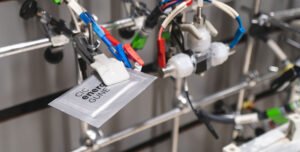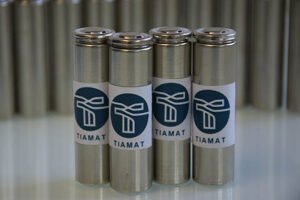Stellantis ventures, the venture fund of the multinational automotive manufacturing corporation stellantis N.V. announced on January 12 that it is investing in French sodium-ion battery startup Tiamat to build electric vehicles (EV) as well as reduce its exposure to scarce resources.

Amount of investment
The exact amount of the investment, which is part of an initial fundraising of 150 million euros from Tiamat, was not disclosed
“The funds will be used in part to build a battery factory in northern France”, Tiamat CEO Harvey Beuffe told reporters.
How Tiamat’s sodium-Ion battery technology attracts Stellantis
Tiamat is a spin-off of the French National Centre for Scientific Research (CNRS). It was among 11 top-performing technology start-ups honoured with a Stellantis Ventures Award in 2023.
Tiamat will use proceeds from the fundraising round, including Stellantis Ventures, to launch the construction of a sodium-ion battery plant in France for power tools and stationary storage applications. Then Tiamat will scale up the production of second-generation products for EV applications.
Tiamat recently commercialized a sodium-ion technology in an electrified product. It is the first company in the world to have recently commercialised a sodium-ion technology in an electrified product.
According to Ned Curic, Stellantis Chief Engineering and Technology Officer, stellantis customers are asking for emissions-free vehicles with a robust driving range, performance and affordability.
Features like durability, cost effectiveness, availability of abundant sodium batteries, low-temperature performance, and faster charging capabilities led stellantis to invest in Tiamat.

Sustainable benefits
Sodium-ion technology offers a lower cost per kilowatt-hour and is free of lithium and cobalt. Abundantly available sodium offers benefits in increased sustainability and material sovereignty.
Can produce batteries without lithium
Born out of France’s State Institute for Scientific Research CNRS in 2017, Tiamat claims it can produce competitive batteries without lithium, a metal highly sought after due to the global electrification boom, which it replaces with far more abundant sodium.
Cost- effectiveness
Sodium-ion technology promises a more cost-effective energy storage than today’s widely used lithium-ion battery technology.
According to Tiamat, Its batteries, which are cheaper but also offer less mileage, will be suited to small vehicles. Their reduced reach can be compensated for by faster charging capacity.
Stellantis’ Strategic move
Stellantis company has been actively taking strategic steps to transition to electric mobility since last year. It is committed to carbon neutrality by 2038 and has secured 400 GWh of battery capacity to meet its ambitious targets.
Ned Curic emphasised the significance of seeking sustainable and affordable battery solutions, aligning with Stellantis’ 2030 strategic plan.
The 2030 strategic plan includes transitioning to electric propulsion, aiming for a 100% passenger car battery electric vehicle (BEV) sales mix in Europe and a 50% BEV sales mix in the United States by 2030.

Alongside Tiamat, Stellantis is investing in diverse technologies, including solid-state batteries with Factorial Energy and lithium-sulphur chemistry with Lyten Inc.
The company partnered with technology firm Ample to integrate Ample’s modular battery swapping solution into its electric vehicles in December. This enables customers to replace a depleted EV battery with a fully charged battery within minutes.
Earlier in November, the company also announced plans to ramp up vehicle production across Italy, with negotiations set to begin with the Italian government to establish a comprehensive agreement focusing on the automotive industry in Italy.











Comments 1